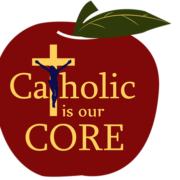Let’s Move Beyond the Common Core in Catholic Schools
By now, it should be apparent that the Common Core State Standards for schools won’t come close to fulfilling the grand promises of its proponents.
Parents, scholars, unions and the media all seem to be painfully aware of the fact — but after the mad rush to implement the standards, create new tests and market new textbooks, there doesn’t seem to be a lot of momentum to change course.
At least, that’s true of the nation’s public schools. But our Catholic schools can and should do much better, with standards that truly reflect their Catholic mission. I get the sense that most Catholics are eager to move above and beyond, and many dioceses are already working on it.
Last December, the Associated Press reported a “backlash” against Common Core in Catholic schools. Families want what’s best for their kids, and so do Catholic school leaders. Now’s the time to unite behind something better.
A major new report on the Common Core might be just the catalyst that we need to finally break away. After the Fall: Catholic Education Beyond the Common Core is published by the reputable Pioneer Institute and the American Principles Project, whose founder Robert George of Princeton University joined more than 130 Catholic scholars in a letter criticizing the Common Core in 2013.
The new report presents a rather dismal picture of Catholic education under the Common Core, but its conclusion is hopeful, suggesting that Catholic schools may have a special opportunity amid the chaos to reassert their superiority. Urging the Church to embrace and celebrate faithful Catholic education, the authors claim, “Now is the time for Catholic schools to press their advantage.”
Nothing could be more welcome to beleaguered Catholics today, after the long slide in Catholic school enrollment and Catholic identity over recent decades. In today’s society, we greatly need strong Catholic schools.
Incompatible and unsuited
The authors of After the Fall know this well. Anthony Esolen is the insightful author and critic from Providence College whose expertise is literature — perhaps the worst casualty of the Common Core. Dan Guernsey is the visionary expert in Catholic education who is launching an outstanding teacher program at Ave Maria University and leads The Cardinal Newman Society’s K-12 education programs. Jane Robbins of the American Principles Project and Kevin Ryan of Boston University have made great contributions to education policy, especially in their criticism of the Common Core.
Together they have provided Catholics “a tremendous service,” according to two of America’s former ambassadors to the Vatican: Harvard law professor Mary Ann Glendon and former Boston Mayor Raymond Flynn. In their preface to the report, Flynn and Glendon declare the Common Core standards “incompatible with and unsuited for a traditional Catholic education.”
The specific arguments are provided by the authors of After the Fall. They delve into three “insufficiencies” of the Common Core: its “misunderstanding of the nature of character formation due to a corrupting workforce-development view,” its “misunderstanding of the nature of literature due to a lack of understanding about man, creativity, and God,” and its “misunderstanding of the liberal arts due to a lack of understanding about the relationship of man and God to each other and to everything else.”
They could have simply written that the Common Core ignores what is most important to Catholics about God and man. But that’s the point that critics have been saying all along. What makes After the Fall such an important document is that it carefully examines and debunks arguments for the Common Core and then explains the case for faithfully Catholic standards of education, all in great detail. It should convince the most devoted fan of the Common Core.
The intended audience is clearly Catholic school leaders and scholars, but any Catholic will benefit from its outstanding defense of authentic Catholic education.
Toward better standards
After the Fall validates many of the concerns of Common Core critics, but it shouldn’t be used simply for an “I told you so” moment. Instead, as the authors strongly encourage, now is the time to more deeply examine the purpose of Catholic education and embrace educational standards that appropriately drive the curriculum and fulfill the mission of Catholic schools. The prospect is very exciting.
“A benefit of the Common Core to Catholic schools,” according to authors of After the Fall, “is that it has drawn attention to the need for Catholic educators to better articulate exactly what the unique standards and elements of Catholic education might be.”
Next week, The Cardinal Newman Society will be releasing Catholic curriculum standards to help move this process forward. Dioceses and other organizations have made important contributions as well.
After the Fall is what the Education Department of the U.S. Conference of Catholic Bishops recommended three years ago, when it warned, “The CCSS [Common Core] should be neither adopted nor rejected without review, study, consultation, discussion and caution.” The office also advised:
Catholic schools must consider standards that support the mission and purpose of the school as a Catholic institution. Attempts to compartmentalize the religious and the secular in Catholic schools reflect a relativistic perspective by suggesting that faith is merely a private matter and does not have a significant bearing on how reality as a whole should be understood. Such attempts are at odds with the integral approach to education that is a hallmark of Catholic schools. Standards that support an appropriate integration should be encouraged.
Well-intentioned Catholic educators have tried to contort Common Core to fit within Catholic schools. But as the After the Fall authors suggest, such efforts ultimately will not be successful, because the design and purpose of the standards makes them impossible.
Focusing standards on the mission of Catholic schools, however, is eminently possible — and necessary. It’s a great time to get it done.
This article first appeared at The National Catholic Register.

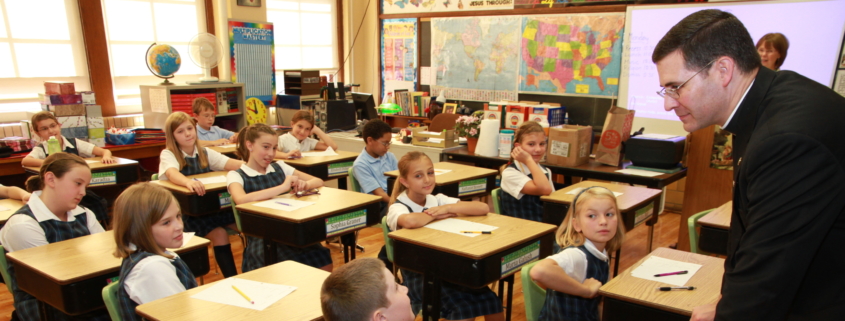 St. Agnes School, St. Paul, MN
St. Agnes School, St. Paul, MN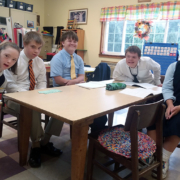
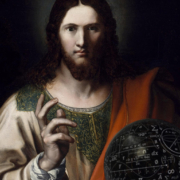
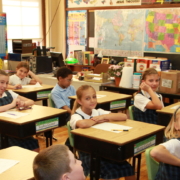 St. Agnes School, St. Paul, MN
St. Agnes School, St. Paul, MN